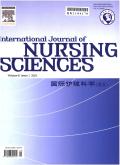Correlated factors of posttraumatic growth in patients with colorectal cancer: A systematic review and meta-analysis
IF 3.1
3区 医学
Q1 NURSING
引用次数: 0
Abstract
Objectives
This systematic review and meta-analysis aimed to identify and synthesize the factors correlated with posttraumatic growth (PTG) in patients with colorectal cancer (CRC).
Methods
PubMed, Web of Science, Embase, PsycINFO, CINAHL, Cochrane Library, China National Knowledge Infrastructure (CNKI), Wanfang database, China Science and Technology Journal Database (VIP) and SinoMed were searched for studies that reported data on the correlated factors associated with PTG in patients with CRC from inception to September 3, 2024. The methodological quality of the included studies was assessed via the Agency for Healthcare Research and Quality (AHRQ) methodology checklist and the Newcastle-Ottawa Scale (NOS). Pearson correlation coefficient (r) was utilized to indicate effect size. Meta-analysis was conducted in R Studio.
Results
Thirty-one eligible studies encompassing 6,400 participants were included in this review. Correlated factors were identified to be significantly associated with PTG in patients with CRC including demographic factors: residential area (r = 0.13), marital status (r = 0.10), employment status (r = 0.18), education level (r = 0.19), income level (r = 0.16); disease-related factors: time since surgery (r = 0.17), stoma-related complications (r = 0.14), health-promoting behavior (r = 0.46), and sexual function (r = 0.17); psychosocial factors: confrontation coping (r = 0.68), avoidance coping (r = −0.65), deliberate rumination (r = 0.56), social support (r = 0.47), family function (r = 0.50), resilience (r = 0.53), self-efficacy (r = 0.91), self-compassion (r = −0.32), psychosocial adjustment (r = 0.39), gratitude (r = 0.45), stigma (r = −0.65), self-perceived burden (r = −0.31), fear of cancer recurrence (r = −0.45); and quality of life (r = 0.32).
Conclusions
This meta-analysis identified 23 factors associated with PTG in CRC patients. Medical workers can combine those relevant factors from the perspective of positive psychology, further explore the occurrence and development mechanism of PTG, and establish targeted interventions to promote PTG.
结直肠癌患者创伤后生长的相关因素:系统回顾和荟萃分析
目的本系统综述和荟萃分析旨在识别和综合与结直肠癌(CRC)患者创伤后生长(PTG)相关的因素。方法检索spubmed、Web of Science、Embase、PsycINFO、CINAHL、Cochrane图书馆、中国知网(CNKI)、万方数据库、中国科技期刊数据库(VIP)和中国医学信息网(SinoMed)自成立至2024年9月3日期间报道CRC患者PTG相关因素的研究。纳入研究的方法学质量通过卫生保健研究和质量机构(AHRQ)方法学检查表和纽卡斯尔-渥太华量表(NOS)进行评估。使用Pearson相关系数(r)表示效应大小。meta分析在R Studio中进行。结果本综述纳入31项符合条件的研究,涉及6400名受试者。与结直肠癌患者PTG有显著相关性的相关因素包括人口统计学因素:居住地(r = 0.13)、婚姻状况(r = 0.10)、就业状况(r = 0.18)、教育程度(r = 0.19)、收入水平(r = 0.16);疾病相关因素:手术后时间(r = 0.17)、造口相关并发症(r = 0.14)、促进健康行为(r = 0.46)和性功能(r = 0.17);心理社会因素:对抗应对(r = 0.68)、回避应对(r =−0.65)、刻意反思(r = 0.56)、社会支持(r = 0.47)、家庭功能(r = 0.50)、恢复力(r = 0.53)、自我效能(r = 0.91)、自我同情(r =−0.32)、心理社会适应(r = 0.39)、感恩(r = 0.45)、耻辱(r =−0.65)、自我感知负担(r =−0.31)、对癌症复发的恐惧(r =−0.45);和生活质量(r = 0.32)。结论:本荟萃分析确定了23个与CRC患者PTG相关的因素。医务工作者可以从积极心理学的角度结合这些相关因素,进一步探讨PTG的发生发展机制,并建立有针对性的干预措施来促进PTG的发展。
本文章由计算机程序翻译,如有差异,请以英文原文为准。
求助全文
约1分钟内获得全文
求助全文
来源期刊

International Journal of Nursing Sciences
Nursing-Nursing (all)
CiteScore
6.10
自引率
2.60%
发文量
408
审稿时长
25 days
期刊介绍:
This journal aims to promote excellence in nursing and health care through the dissemination of the latest, evidence-based, peer-reviewed clinical information and original research, providing an international platform for exchanging knowledge, research findings and nursing practice experience. This journal covers a wide range of nursing topics such as advanced nursing practice, bio-psychosocial issues related to health, cultural perspectives, lifestyle change as a component of health promotion, chronic disease, including end-of-life care, family care giving. IJNSS publishes four issues per year in Jan/Apr/Jul/Oct. IJNSS intended readership includes practicing nurses in all spheres and at all levels who are committed to advancing practice and professional development on the basis of new knowledge and evidence; managers and senior members of the nursing; nurse educators and nursing students etc. IJNSS seeks to enrich insight into clinical need and the implications for nursing intervention and models of service delivery. Contributions are welcomed from other health professions on issues that have a direct impact on nursing practice.
 求助内容:
求助内容: 应助结果提醒方式:
应助结果提醒方式:


